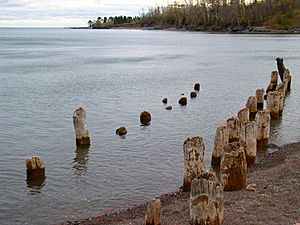Splitrock, Minnesota facts for kids
Quick facts for kids
Splitrock, Minnesota
|
|
|---|---|

Splitrock's wharf, the only obvious remains of the former townsite
|
|
| Country | United States |
| State | Minnesota |
| County | Lake |
| Township | Beaver Bay |
| Time zone | UTC-6 (Central (CST)) |
| • Summer (DST) | UTC-5 (CDT) |
| Area code(s) | 218 |
| GNIS feature ID | 655032 |
Splitrock is a ghost town in Minnesota. It's located in Lake County, right where the Split Rock River meets Lake Superior. From 1899 to 1906, it was a company town. This means a company built and owned the town. It was for workers who cut down trees (logging).
Today, the area is part of Split Rock Lighthouse State Park. It's about 17 miles (27 km) northeast of Two Harbors.
Contents
What Was Splitrock?
Splitrock was created as a logging camp. The Split Rock Lumber Company built it. This company was part of the Merrill and Ring Lumber Company. About 350 men worked in the Split Rock River valley. They cut down many red and white pine trees.
The lumber company owned everything in the town. This included the harbor, the railroad, a coal dock, and the town store. The store even had a post office. Early maps called the community by different names. These included Splitrock, Split Rock, Split Rock Point, or Waterville.
How Logs Were Moved
The company built a railroad that was 10 miles (16 km) long. This railroad carried the cut logs down to the river mouth. There, the logs were dropped into the water from a special platform called a trestle.
The railroad never connected to other train lines. But it was called the Split Rock and Northern Railroad. This helped the company get a tax break. The logs were then moved from a dammed area at the river mouth into the lake.
Moving Logs by Water
Once in the lake, the logs were gathered into large rafts. A tugboat named Gladiator pulled these rafts. It towed them to a sawmill in Duluth.
The Gladiator had a unique feature. It carried carrier pigeons. These pigeons were used to send emergency messages to the company office.
Why Did Splitrock Become a Ghost Town?
By 1906, the logging operation had cut 200,000,000 board feet (500,000 m3) of lumber. This made the company a lot of money, about $863,454. Most of the valuable trees were gone by then.
Because of this, the logging work stopped. The town and its railroad were taken apart the next year. The land where trees had been cut suffered more problems. Several forest fires burned through the area.
Today, the only clear signs of the town are parts of the old wharf. You can also see pieces of the train trestle. This trestle was about 184 feet (56 m) long and 16 feet (5 m) wide. These remains still stick out of the water at the mouth of the Split Rock River.
 | Chris Smalls |
 | Fred Hampton |
 | Ralph Abernathy |



